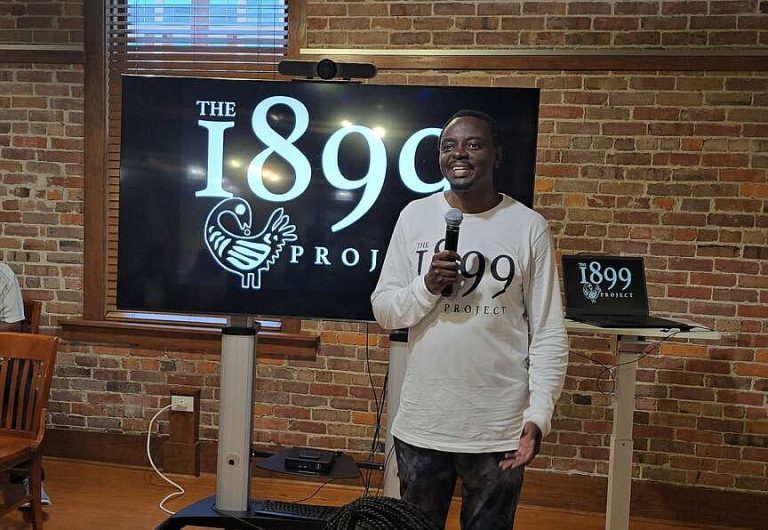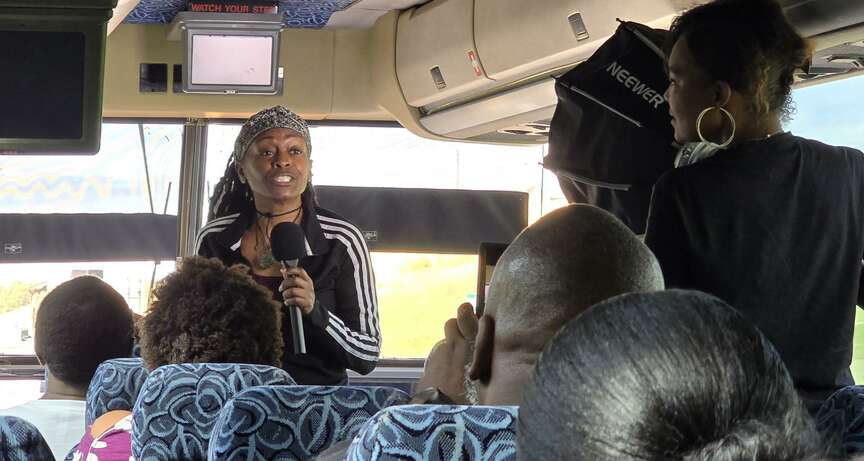ON THE ROAD TO TULSA — Early Sunday morning, a delegation of Pine Bluff and Central Arkansas business owners and students were on their way to Tulsa, Okla., to explore the legacy of Black Wall Street and its connection to their community as part of the third Black Ownership Bus Tour by Remix Ideas.
Led by Benito Lubazibwa, the chief executive officer of ReMix Ideas and founder and executive director of Advancing Black Entrepreneurship (ABE), the trip is aimed at fostering inspiration and understanding as entrepreneurs seek to glean valuable lessons from Tulsa’s historic Black business district and apply them to Pine Bluff’s economic development efforts.
“This trip to Tulsa is very important,” Lubazibwa said. “The reason we decided to go to Tulsa was the connection with Pine Bluff. The person who started Black Wall Street came from Pine Bluff.”
In Tulsa’s Greenwood District, Black Wall Street thrived in the early 20th century as a vibrant hub of Black-owned businesses. Its success, however, was cut short by the devastating Tulsa Race Massacre of 1921, which left the district in ruins. Despite this horrific event, the legacy of Black Wall Street continues to inspire communities across the nation to strive for economic empowerment.
The founder of Black Wall Street was O.W. Gurley, a prominent African American entrepreneur and landowner.
Gurley was born in Huntsville, Ala., but his family relocated to Pine Bluff during his childhood. It was in Pine Bluff where he received his early education and began his entrepreneurial journey. He initially worked as a teacher and later ventured into real estate and other business endeavors.
According to several sources, Gurley’s experiences in Pine Bluff shaped his vision for creating a self-sufficient and prosperous Black community in Tulsa.
Lubazibwa said that Remix Ideas’ primary objective is to foster a nurturing environment for Black entrepreneurs. By empowering them through business ownership, the organization aims to elevate transformative concepts capable of impacting both individual lives and entire communities.
“We need a better infrastructure when it comes to Black-owned businesses,” he said. “The infrastructure is not in our favor.”
Lubazibwa’s goals are focused on “Sankofa,” a principle derived from the Akan people of Ghana, meaning “return and get it” or “go back and fetch it.” “The term embodies the idea that it’s important to reflect on and learn from the past in order to move forward effectively,” he said.
The Pine Bluff delegation, comprised of various business owners and community leaders, said they are looking forward to several days in Tulsa and immersing themselves in the history and spirit of Black Wall Street. They will visit key landmarks, including the Greenwood Cultural District and Oasis Fresh Market to name a few.
Mary Hester-Clifton, UAPB’s Institutional Advancement Office of Communication director, said she is looking forward to experiencing the history. “It’s very true when we don’t understand our past it’s hard for us to be strategic or on point on our current or our future,” she said.
Joni Alexander-Robinson, the CEO of the recently founded Pine Bluff Black Chamber of Commerce, expressed her eagerness to establish connections and gain insights into the Tulsa community.
“Hopefully we can implement some things they did but also learn from some things that they probably didn’t do that we could do if we want to have this type of entrepreneurial movement in Pine Bluff,” said Alexander-Robinson.
Growing up in Pine Bluff, Alexander-Robinson was unaware of the city’s connection to Black Wall Street, a significant historical event.
“It makes me feel even more connected and proud of my community,” she said. “I think if we can get information like this out to younger people, it will give them more pride in their community.”
The students on the trip said they are looking forward to witnessing the resilience and determination of the Black community in rebuilding Black Wall Street after the massacre and seeing what the importance of unity and collaboration in achieving economic success is all about. During the massacre, white mobs destroyed hundreds of Black-owned businesses as well as some 1,250 Black-owned homes. The number of Black individuals killed has been estimated at 300.
“We are going to study the mindset of Black people during that time when it was difficult to start a business and there was systemic racism,” said Lubazibwa. “They were able to come together and build an economic community from businesses to schools. If they can do that in 1921, there is something we can learn from them. To me the lesson learned is they were able to create something for them not a gift for someone else but it was built by Blacks for Blacks. That is very powerful to me.”
Returning back to Pine Bluff on Tuesday, the bus tour will visit several Black-owned businesses and host a pitch competition for student entrepreneurs at the University of Arkansas Pine Bluff. The evening will conclude with the 1899 Project Pitch Competition and Taste of Pine Bluff networking event at the Artspace on Main at 6 p.m. on Tuesday in collaboration with the Pine Bluff Black Chamber of Commerce.






